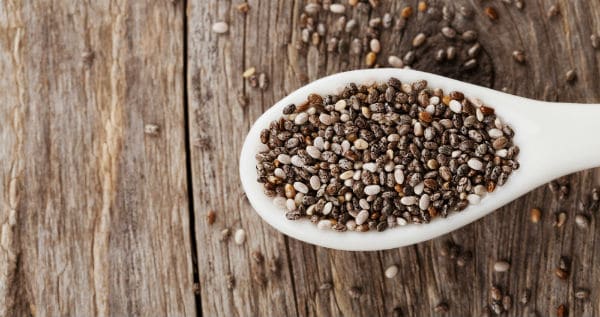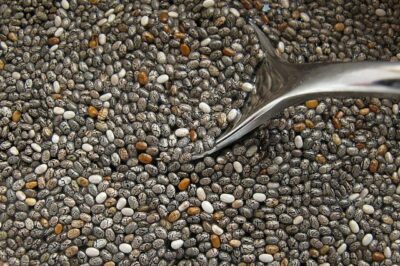Table of Contents[Hide][Show]
I’m happy to say that what’s good for our insides is often good for our outsides as well, which is true for chia seeds. When their oil is extracted, it makes a great addition to skin care formulas, because it helps increase skin hydration, temporarily alleviate itchy skin, and fortify skin barrier function, reducing the appearance of wrinkles and leaving skin soft and smooth.
Cold pressed into oil, these seeds are super moisturizers.
A Little Bit About the Ingredient Itself
If you’ve heard of “chia pets,” which were big in the 1980s, you’ve had some experience with chia. When the seeds sprout, they look a little like alfalfa sprouts. A member of the mint family, chia has a long history of use in the Incan and Mayan cultures, where they were an important energy source because of their high protein content. In fact, the Indians of the Southwest and Mexico used to call the seeds “running food” because of their high energy content. The Aztecs also used them for making flour and oil.
Today, chia seeds are the perfect healthy snack for those looking for a high-fiber, high-protein, and high-omega-3-fatty-acid food. They’re low in cholesterol and sodium, but high in antioxidants, and are also good sources of potassium, calcium, iron, phosphorus, and manganese.
Internal Health Benefits of Chia
Studies have shown that chia seeds have many health benefits. Preliminary research shows they may help people with diabetes control their blood sugar levels. Animal studies show that diets rich in chia seeds lower LDL cholesterol and triglyceride levels, while increasing HDL levels.
Because of their high levels of essential fatty acids, they’re also believed to help boost brainpower and support healthy cardiovascular function.
Chia’s Benefits to the Skin
Chia seed is considered the richest botanical source of omega-3 fatty acids found in nature, offering more than flax seed or fish oil. These fatty acids work to encourage a more plump look to the skin. They also help maintain moisture levels, which reduces the appearance of fine lines and wrinkles as well as relieving dryness and peeling.
Chia seed oil is also a great source of vitamin B3 and zinc, which helps with oily skin and clogged pores. Many people prize it for its antioxidants, including chlorogenic acid and caffeic acid, as well as myricetin, quercetin, and kaempferol flavonoids. These components offer protection from environmental stressors. In fact, the antioxidants in chia seed oil have shown to be even stronger than vitamin C and vitamin E, two common and powerful antioxidants.
Try It!
Put all of chia seed oils properties together—moisturizing, protecting, and calming—and you have the perfect ingredient for all around anti-aging and moisturizing skin care. Try these two products and see what you think.
Have you tried chia seed oil on your skin? How else do you use it?
by Annmarie Gianni
* * *
Source
Se Kyoo Jeong, et al., “Effectiveness of Topical Chia Seed Oil on Pruritus of End-Stage Renal Disease (ESRD) Patients and Healthy Volunteers,” Ann Dermatol. 2010 May; 22(2): 143-148. http://www.ncbi.nlm.nih.gov/pmc/articles/PMC2883415/.








Is chia seed oil appropriate for acne-prone skin? Thanks!